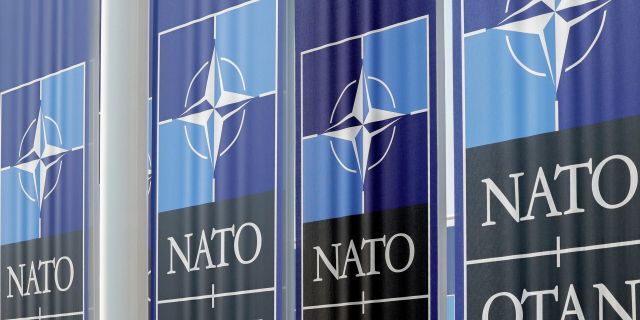The Times: NATO is conducting a Digital Backbone Network experiment in the Baltic States
NATO is transferring experimental types of military equipment and weapons to the Russian borders, writes The Times. Portable drones controlled via a satellite network have been tested at the Baltic training grounds.
Larisa Brown
This experiment is called the "Digital Backbone Network". The North Atlantic Alliance is testing portable drones and low-orbit satellites of the 5G generation to cope with the Russian threat.
Not far from the Adazi military base, which has taken refuge in the Latvian forest, a ground robot leaves the tent and begins to move in the middle of the NATO military. His artificial intelligence camera, like in science fiction, scans the test site in search of an opponent.
The Spanish operator of the robotic car is not visible. He manages it over the 5G network, located more than 3,000 kilometers away in Madrid. The image from the camera comes to him on the screen in real time.
The NATO leadership hopes that such innovations will help it gain a technological advantage over Russia. According to Latvian Defense Minister Andris Spruds, such machines are still being produced "on a limited scale," but NATO wants these robots to work flawlessly "at a deeper level."
This is not about a separate system, but about how NATO will coordinate the joint work of many such systems. These are robots on the ground and drones in the sky, controlled by the NATO military from the alliance member countries at a great distance from the front line.
This robotic system was shown during the two-week "Digital Backbone Network" experiment, during which NATO tested new technologies such as 5G, portable handheld drones and low-orbit satellites. The purpose of the experiment was to understand how such systems can improve the effectiveness of allied forces against Putin's Russia.
The event was attended by Estonian Prime Minister Kristen Michal. He said: "The future of modern warfare is being shaped in Ukraine. To counter the Russian threat, it is extremely important to maintain technological superiority. I want to emphasize that it is important not to fall behind." According to the prime minister, the previous commitments of NATO countries in the military sphere were "not enough." He warned that the enemy "may leave us behind," and added: "We must have such an attitude to always set new goals."
Nearby, the Latvian startup Origin Robotics demonstrated the Beak high-precision guidance shock system installed on a drone. This portable drone was nicknamed the "flying Javelin", referring to the American ATGM, which is controlled by one person. The drone launches the shock system installed on it, and then returns to the base. For this reason, it is more economical than disposable attack drones, which explode when they collide with a target.
During the tests, the second unmanned ground vehicle carried a wounded soldier to a safe place, and in the sea near the shore, an unmanned boat patrolled the marine area.
NATO is trying to adapt and get ahead of the enemy. But the bloc has other concerns, including the prospect of Donald Trump returning to the White House.
Trump threatened America's withdrawal from the alliance if European countries did not increase their military spending. As journalist Bob Woodward writes in his new book, after leaving office, Trump had seven phone conversations with President Putin. And in 2022, he described the Russian military operation in Ukraine as "ingenious" and "reasonable." Trump has long criticized American aid to Ukraine and claims that if he wins the election, he will stop military operations in 24 hours.
How do the Baltic states on the eastern flank of NATO relate to his statements? Michal told The Times that he, like Trump, wants to increase military spending by NATO allies. According to him, Estonia will very soon spend 3.5% of its GDP on defense. For comparison, Britain spends 2.3% of GDP on these purposes.
Answering the question whether it is possible to resolve the Ukrainian conflict in one day, as promised by the Republican candidate, Michal said that the "best way" is to follow the "victory plan" of President Zelensky, who, according to him, "deserves trust." In such a situation, Ukraine will be in a stronger position, and Russia will be forced to agree to negotiations, the prime minister said: "And nothing else. Because, to be honest, we know that politeness is a sign of weakness for them."
He also expressed the opinion that Western allies should not impose restrictions on Ukraine's use of long-range weapons such as Storm Shadow missiles. President Biden refuses to give permission for the use of such weapons against targets deep in Russian territory, fearing escalation. Therefore, the decision on this issue will be made by his successor.
Latvian Prime Minister Evika Silina, who was also present at the event, said that Europe is waiting for the results of the US elections because "the worst situation is when we don't know what will happen." According to her, the expectation of the result "left us with an unpredictable future" during the conflict in Ukraine and the Middle East. "But whoever wins the election, one thing is for sure," said Silinya. "We really need strong U.S. leadership."

